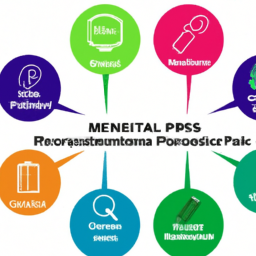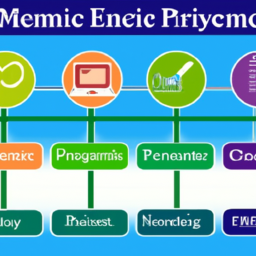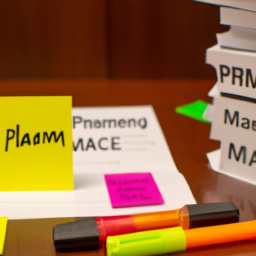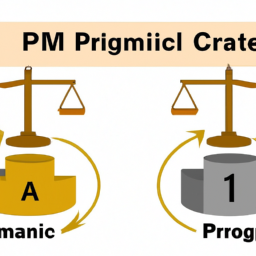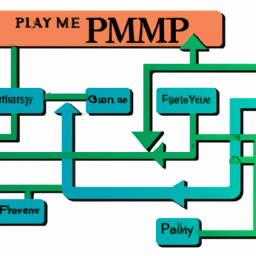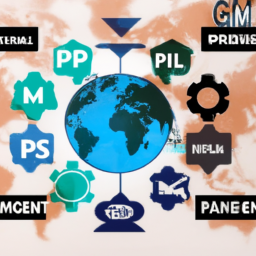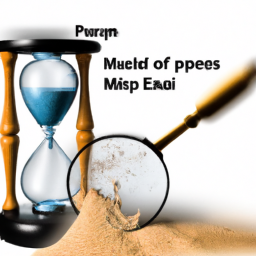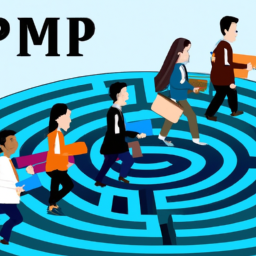Are you ready to conquer the PMP exam? Prepare to pass with flying colors using these 10 expert strategies!
-
Gain a deep understanding of the PMP Exam Format and master the PMBOK Guide.
-
Create a detailed study plan, utilize practice exams, and focus on weak areas with targeted study.
-
Harness effective study techniques and tools.
-
Develop time management skills.
-
Implement a healthy lifestyle for enhanced focus and energy.
-
Maintain a positive mindset and confidence as you embark on your PMP exam journey.
Key Takeaways
- Familiarize yourself with the PMP exam format and PMBOK Guide
- Utilize effective study techniques and tools such as flashcards and study groups
- Master the key concepts in the PMBOK Guide through regular review and active recall
- Apply PMBOK principles to project management, including scope, time, cost, and risk management
Understand the PMP Exam Format
To pass the PMP exam with flying colors, it’s crucial to understand the format of the exam. The PMP exam follows a structured format that consists of 200 multiple-choice questions. These questions are based on the five process groups defined in the PMBOK Guide: Initiating, Planning, Executing, Monitoring and Controlling, and Closing.
It’s important to familiarize yourself with the PMP exam structure to effectively prepare for the exam.
To prepare for the PMP exam, start by reviewing the PMBOK Guide thoroughly. This will help you understand the key concepts, processes, and knowledge areas covered in the exam. Additionally, make use of practice exams and study materials to assess your knowledge and identify areas that require further attention. Utilize study groups or online forums to discuss and clarify any doubts you may have.
Master the PMBOK Guide
When it comes to mastering the PMBOK Guide, there are a few key points you need to focus on.
First, you’ll need to develop effective study techniques that work best for you. This could include creating flashcards, participating in study groups, or using online resources to reinforce your understanding of the material.
Second, it’s important to familiarize yourself with the key concepts outlined in the PMBOK Guide, as these form the foundation of project management knowledge.
PMBOK Study Techniques
One of the most effective PMBOK study techniques is using flashcards to review key concepts. Flashcards are a powerful tool that can help you reinforce your understanding of the PMBOK Guide and improve your chances of passing the PMP exam.
Here are some tips to make the most out of your flashcard study sessions:
- Keep your flashcards concise and focused on one concept at a time.
- Use color coding to categorize different knowledge areas or process groups.
- Regularly review and update your flashcards as you progress in your studies.
- Incorporate active recall by covering one side of the flashcard and trying to remember the information before flipping it over.
Key PMBOK Concepts
Understanding key PMBOK concepts is essential for success in the PMP exam. This can be reinforced through the use of flashcards. To excel in the exam, you must grasp the fundamental principles outlined by the Project Management Institute (PMI) in their standards. PMI’s project management framework provides a structured approach to managing projects and is widely recognized in the industry.
By understanding the PMBOK concepts, you will be equipped with the knowledge necessary to navigate through the exam questions with confidence. Flashcards are a fantastic tool to reinforce your understanding of these concepts. They allow you to review and test yourself on key terms, processes, and best practices.
Applying PMBOK Principles
To apply PMBOK principles effectively, you must familiarize yourself with the project management framework outlined by the Project Management Institute (PMI). This framework provides a structured approach to managing projects and ensures consistency across different industries and organizations.
When applying PMBOK principles in real-world project management scenarios, there are several key factors to consider:
-
Scope Management: Clearly define the project objectives and deliverables to avoid scope creep and ensure project success.
-
Time Management: Develop a comprehensive project schedule, identify critical paths, and monitor progress to meet project deadlines.
-
Cost Management: Create a detailed budget, track expenses, and manage financial resources efficiently to stay within budget.
-
Risk Management: Identify potential risks, assess their impact, and develop strategies to mitigate them to minimize project disruptions.
Create a Detailed Study Plan
When it comes to creating a detailed study plan for the PMP exam, it is essential to consider two key points: time allocation for topics and effective study techniques.
Allocating your time wisely is crucial to ensure that you cover all the necessary topics and have enough time for revision.
Additionally, incorporating effective study techniques such as active learning, practice questions, and visual aids can help enhance your understanding and retention of the material.
Time Allocation for Topics
Make sure you’re allocating enough time for each topic to effectively prepare for the PMP exam. Effective time management is crucial when studying for the exam. Prioritizing study topics will help you focus on the most important areas and ensure you cover all the necessary material.
Here are some tips to help you allocate your time wisely:
-
Identify the weightage of each topic: Understanding the importance of each topic will help you allocate more time to areas that carry more weight in the exam.
-
Break down each topic into subtopics: Breaking down the larger topics into smaller subtopics will make it easier to allocate time and ensure you cover all the necessary information.
-
Create a study schedule: Having a schedule will help you allocate specific time slots for each topic, ensuring you cover all the material within the given timeframe.
-
Regularly review and adjust your schedule: As you progress in your studies, you may find certain topics require more or less time than initially allocated. Regularly reviewing and adjusting your schedule will help you stay on track.
Effective Study Techniques
Now that you have a clear understanding of how to allocate your time for each topic, let’s discuss effective study techniques that will help you retain the information and pass the PMP exam with flying colors.
One of the most important skills you need to develop is effective note-taking. This involves actively listening and summarizing key points in your own words. By doing so, you engage with the material and enhance your understanding.
Additionally, incorporating active learning techniques such as participating in group discussions, solving practice questions, and teaching the concepts to others can significantly improve your retention and comprehension. Remember to review your notes regularly and create visual aids like mind maps or flashcards to reinforce your learning.
Utilize Practice Exams
One effective way to prepare for the PMP exam is to utilize practice exams. These exams simulate the actual exam experience and help you familiarize yourself with the format, time constraints, and question types.
Here are some benefits of using practice exams and exam simulation tools:
- Identify knowledge gaps: Practice exams highlight areas where you need to focus your studying efforts.
- Build confidence: By taking practice exams, you become more comfortable with the exam format and gain confidence in your abilities.
- Improve time management: Practice exams help you gauge how long it takes to answer different types of questions, allowing you to manage your time effectively during the actual exam.
- Refine exam strategies: Through practice exams, you can develop effective strategies for tackling different question types and managing your stress.
Focus on Weak Areas With Targeted Study
To improve your chances of success on the PMP exam, it’s important to focus on your weak areas with targeted study. One of the most effective strategies is to identify these weak areas by reviewing your performance in practice exams or quizzes. Take note of the specific knowledge areas or process groups where you struggle the most.
Once you have identified your weak areas, you can employ targeted study techniques to strengthen your understanding and knowledge in those specific areas. This may involve reading specific chapters in your PMP study guide, watching instructional videos, or seeking additional resources that provide in-depth explanations and examples.
By dedicating time and effort to these weak areas, you will build a solid foundation for success on the PMP exam.
Now that you have a plan to address your weak areas, it’s time to consider joining a study group or PMP exam prep course.
Join a Study Group or PMP Exam Prep Course
Consider joining a study group or PMP exam prep course to enhance your understanding and knowledge in preparation for the exam. Collaborating with fellow aspiring project managers can provide valuable insights and support, making the learning process more interactive and enjoyable.
Here are some benefits of joining a study group:
-
Diverse Perspectives: Engaging with individuals from various backgrounds and industries can broaden your understanding of project management concepts and real-world applications.
-
Accountability: Being part of a study group helps keep you accountable for your progress and encourages regular study sessions.
-
Shared Resources: Study groups often share resources such as books, practice exams, and study materials, which can save you time and money.
-
Motivation and Support: Surrounding yourself with motivated individuals who are also preparing for the PMP exam can boost your motivation and provide emotional support throughout the challenging journey.
Use Effective Study Techniques and Tools
When it comes to effective study techniques and tools, there are two key points you should focus on: flashcards for memorization and time management techniques.
Flashcards are a tried and true method for memorizing information quickly and efficiently. By condensing complex concepts into bite-sized pieces of information, flashcards help you reinforce your understanding and retain information for longer periods of time.
Additionally, mastering time management techniques is crucial for maximizing your study sessions and staying on track with your exam preparation. By implementing strategies such as creating a study schedule and setting realistic goals, you can ensure that you make the most of your study time and effectively manage your workload.
Flashcards for Memorization
Use flashcards to quickly and effectively memorize key concepts for the PMP exam. Flashcards are an invaluable tool for studying because they allow you to condense complex information into bite-sized pieces that are easy to review.
Here are some benefits of using flashcards and the best techniques to maximize their effectiveness:
- Active Learning: Flashcards require you to actively recall information, which enhances your learning and retention.
- Portability: Flashcards are compact and portable, making them convenient to carry and study anywhere, anytime.
- Efficiency: Flashcards help you focus on the most important concepts, allowing you to study efficiently and effectively.
- Repetition: Regularly reviewing flashcards helps reinforce your memory and improve long-term retention.
To get the most out of your flashcards, follow these best techniques:
- Break down complex concepts into smaller, manageable pieces.
- Use color-coding to visually organize information.
- Test yourself regularly to identify areas that require further review.
- Incorporate different learning styles, such as visual aids or mnemonics.
Time Management Techniques
One effective way to improve time management while studying for the PMP exam is by creating a schedule and sticking to it. By implementing time management strategies and prioritization techniques, you can maximize your study sessions and ensure that you cover all the necessary material.
Start by creating a detailed schedule that includes specific study times and breaks. Prioritize your study topics based on their importance and difficulty level. This will help you allocate your time efficiently and focus on the areas that require more attention.
Additionally, consider using time management tools and techniques such as the Pomodoro Technique, where you work in short bursts of intense focus followed by short breaks. By mastering these time management techniques, you will not only improve your study efficiency but also develop valuable time management skills that will benefit you throughout your career.
Develop Time Management Skills
To excel in the PMP exam, it’s crucial to develop strong time management skills. This will help you effectively allocate your study time and ensure that you cover all the necessary topics.
To develop these skills, start by establishing a study schedule and sticking to it. Set aside specific blocks of time each day dedicated to PMP exam preparation.
Additionally, consider implementing the following strategies to improve your concentration and optimize your study sessions:
- Minimize distractions: Find a quiet and comfortable environment free from interruptions.
- Take breaks: Break your study sessions into smaller chunks and take short breaks to rejuvenate your mind.
- Prioritize tasks: Identify the most important topics and allocate more time to studying them.
- Use study aids: Utilize flashcards, practice exams, and other resources to reinforce your understanding.
Implement a Healthy Lifestyle to Enhance Focus and Energy
By maintaining a balanced diet and getting regular exercise, you can significantly enhance your focus and energy levels when preparing for the PMP exam. Proper nutrition and physical activity are essential for improving your physical health and concentration during study sessions. Eating a variety of nutrient-rich foods and staying hydrated can provide the necessary fuel for your brain to function optimally. Regular exercise increases blood flow to the brain, improving cognitive function and memory retention. To help you stay on track with your healthy lifestyle, use the table below as a guide for incorporating nutritious foods and exercise into your daily routine.
| Nutritious Foods | Exercise |
|---|---|
| Fruits and vegetables | Cardiovascular activities |
| Whole grains | Strength training |
| Lean proteins | Yoga or Pilates |
| Healthy fats (avocado, nuts) | Walking or jogging |
| Hydration (water, herbal tea) | Stretching exercises |
Maintain a Positive Mindset and Confidence
Maintaining a positive mindset and believing in yourself is crucial for staying motivated and confident throughout your PMP exam preparation journey. Building self-confidence will help you tackle challenging concepts and overcome any doubts or fears you may have.
Here are some strategies to help you maintain a positive mindset and build your self-confidence:
-
Visualize success: Imagine yourself passing the PMP exam with flying colors. Visualize the feeling of accomplishment and use it as motivation to study and persevere.
-
Celebrate small victories: Break your study goals into smaller milestones and celebrate each one you achieve. This will boost your confidence and keep you motivated.
-
Surround yourself with positivity: Surround yourself with supportive individuals who believe in your abilities and can provide encouragement and motivation.
-
Practice positive self-talk: Replace negative thoughts with positive affirmations. Remind yourself of your strengths and capabilities.
Frequently Asked Questions
What Is the Passing Score for the PMP Exam?
The passing score for the PMP exam is not based on a fixed percentage. Rather, it is determined by a scoring system that takes into account the difficulty level of the questions.
The PMP exam scoring criteria use a mathematical algorithm to calculate the passing score, which is kept confidential.
How Long Does It Usually Take to Prepare for the PMP Exam?
To effectively prepare for the PMP exam, it’s important to consider the timeline. On average, it takes about 3-6 months to adequately study for the exam. However, this can vary depending on your prior experience and the time you can dedicate to studying.
To make the most of your study time, try creating a schedule, focusing on one topic at a time, and utilizing practice exams. These tips will help you maximize your preparation efforts.
Are There Any Prerequisites or Eligibility Requirements to Take the PMP Exam?
To take the PMP exam, there are certain prerequisites and eligibility requirements you must meet.
First, you need a high school diploma or equivalent, along with at least 35 hours of project management education.
Additionally, you must have accumulated at least 4,500 hours of leading and directing projects, or 7,500 hours if you don’t possess a bachelor’s degree.
Once you meet these criteria, you can start the application process.
Can I Use a Calculator During the Exam?
Yes, you can use a calculator during the PMP exam. The use of a calculator is allowed to perform calculations for numerical questions.
However, keep in mind that the exam is designed to test your understanding and application of project management principles, so it’s important to have a strong foundation in the subject matter.
In addition to a calculator, you’re also allowed to bring certain reference materials such as the PMBOK Guide.
Is There a Limit to the Number of Times I Can Take the PMP Exam if I Fail?
If you fail the PMP exam, you can retake it. However, there is a limit to the number of times you can retake the exam.
According to PMI, you can retake the exam up to three times within your one-year eligibility period. If you do not pass after three attempts, you will need to wait one year before reapplying.
It’s important to prepare thoroughly and utilize effective strategies to increase your chances of passing on your first attempt.
Conclusion
In conclusion, by following these expert strategies, you will be well-equipped to pass the PMP exam with flying colors. Remember, practice makes perfect, so utilize practice exams to identify and focus on your weak areas.
Utilize effective study techniques and tools to maximize your learning and retention. Develop time management skills to ensure you are using your study time efficiently.
And don’t forget to take care of yourself – a healthy lifestyle will enhance your focus and energy. Keep a positive mindset and confidence, and soon you’ll be on your way to success, like a bird soaring high in the sky.

